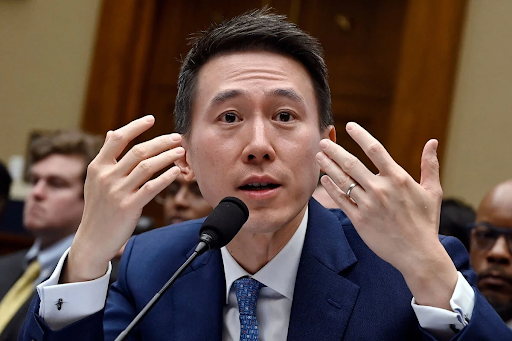TikTok’s Clock is Ticking
Shou Zi Chew (CEO of TikTok) testifies in Congress against claims that his app is being used as a spy balloon for the Chinese Communist Party (CCP). Source for photo: Mashable
From funny pranks to life hacks to energetic dances, TikTok boasts a wide variety of content presented in videos which can last just a few seconds or up to several minutes. The app has skyrocketed to popularity in the United States as the possibility of “going viral” encourages users to create and post their own unique content in hopes of gaining attention and fame. Yet the ability of people to connect to each other from all over the world is concerning to national security analysts.
On March 7, 2023, a new bill was proposed by a group of 12 US Senators, representing both the Democratic and Republican Parties in equal numbers. This bill, known as the RESTRICT Act, would give the government powers to disrupt and prevent “transactions involving information and communications technology products in which any foreign adversary has any interest and poses undue or unacceptable risk to national security.” Though it appears the bill is mainly directed at TikTok, the passage of this bill would introduce a new level of authority for the government in censoring and controlling media. This includes the power of total prohibition of certain platforms that are deemed a threat to the data security of the United States. The stringency of the act is surprising; if the act passes and certain apps and websites are banned, anyone convicted of using a VPN to continue to access these platforms could be fined a minimum of $1,000,000 and sentenced to up to 20 years in prison depending on the intent of their actions.
Congresspeople are concerned that the Chinese government could access TikTok users’ personal data since the parent company of TikTok, ByteDance, is required by Chinese law to turn over any data as requested to the Chinese government. The proponents of the RESTRICT Act think that ByteDance can access user data to track location as well as source browsing history. However, TikTok is not available in China, though a similar app is available under a different name. Instead, TikTok operates out of its headquarters in Singapore and Los Angeles, California. In a previous response to allegations of data mining, TikTok has already begun Project Texas, an effort that would allow United States tech company Oracle to oversee the data which enters and exits the app to ensure the scrutinized social media company is not violating U.S. security protocols.
On Thursday, March 23, TikTok CEO Shou Zi Chew testified before Congress against claims that the app violates users’ privacy. During the hours of questioning, Chew continuously rebutted accusations that the app shared any data with the Chinese Communist Party (CCP). A security breach is not the only concern of lawmakers; other Congresspeople are attacking the app for promoting destructive behaviors among children such as eating disorders and self-harm. Additionally, they are worried that young viewers are being exposed to inappropriate content and that TikTok standards do not remove videos which violate the content-posting guidelines. Chew responded by saying the company has been working hard to clear the app of this type of content and claimed that TikTok is not the only platform on which children can come across potentially harmful content. He also argued that it would be wrong to ban TikTok, as it is such a large competitor with other tech companies such as Meta, and that the absence of TikTok could allow Meta to become a monopoly on the social media market.
TikTok has already come under scrutiny and has been restricted in many other countries with strained relations with China. India permanently banned TikTok in 2020 due to privacy concerns, and Pakistan has placed several temporary bans on the app due to the inappropriate content that is accessible to young viewers. In addition, countries such as Canada and the U.K. have banned TikTok from government-issued devices. This is not the first time the United States has looked into these kinds of restrictions, either. Last December, the Biden administration banned the app from government devices, citing security concerns. Additionally, former President Donald Trump attempted a total ban of TikTok and other Chinese-owned apps in 2020; however, the company opened a lawsuit and a federal judge halted his executive order, ruling that such an action was outside the purview of the president.
A ban on TikTok or any other app would constitute a considerable violation of free speech. The ban is particularly pertinent to people who depend on TikTok for their livelihood. Top creators make brand deals and get sponsorships from companies, allowing them to make thousands of dollars per video posted. Some online personalities have built their entire careers around being “TikTok famous,” having used their fame and popularity on the app to gain access to other opportunities and grow their presence on other social media platforms.
If the bill passes into law, it would set a new precedent for the scope of government power. Banning TikTok could be just the beginning of how far the United States government reaches into the personal lives of its citizens. Even just the notion of a ban has received such a large backlash that it could only get worse with time as people have limits placed on their self expression.

